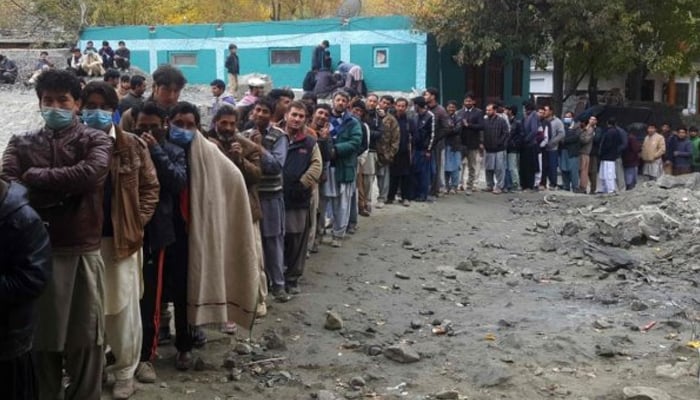Women fail to grab a single seat in Gilgit Baltistan Elections 2020
Gilgit Baltistan's women are continuing their battle for representation after all the female candidates contesting the elections lost
Gilgit Baltistan's women are continuing their battle for representation after four female candidates — the total women who had contested in this year's election — lost the polls again, according to the results of the unofficial and provisional election.
It was a close call, however, for PTI’s Amina Bibi, who lost with 3,180 votes to independent candidate Abdul Hameed.
In 2009, four women were in the running to be elected in GB. That number fell to three in 2015. This year, again, only four women jumped into the fray. The women were: Pakistan Tehreek-e-Insaf’s Amina Bibi, Pakistan Peoples Party’s Sadia Danish, Jamiat Ulema-e Islam-F’s Mehnaz Wali, and independent candidate Shahnaz Bhutto — contesting from GBA 20 Ghizer.
The independent candidate, Bhutto, lost with 70 votes in GBA-20 Ghizer. In the GBA-6 Hunza constituency, JUI-F’s Wali came second last with only six votes, while PPP’s Danish managed to get only nine votes in GBA-18 Diamer-4.
In Pakistan, for any female election candidate, the hurdles are the same: they face indifference, mockery, resistance from voters, and lack of interest from their own political parties when tickets are awarded. This is why in the 2018 polls, only eight women won general contestable seats for the Parliament, out of the 272 up for grabs.
But in Gilgit-Baltistan, Pakistan’s northernmost administrative region, the battle is even harder. In the 33-member strong legislative assembly of the region, few women vote, fewer contest, and none have to date pulled out a victory.
Who are these four women?
Wali has previously sat on the seats reserved for women in the Gilgit-Baltistan Legislative Assembly. She has also served as the education minister in the region. Still, in the assembly, she was often ignored and ridiculed by male lawmakers.
“Whenever I would raise an issue in the House, I was told to stay quiet,” she told Geo.tv over the phone, “They [the men] would say you are a woman, you are on a reserved seat, you have no right to speak.”
Wali, who is a resident of the constituency GBLA-1 in Gilgit was hoping to represent her hometown in the polls this year, but her party chose to award the ticket to her male colleague, Abdul Hameed Gujjar. She then listed on the ballot in GBLA-6 in Hunza, as a JUI-F candidate.
Despite her political party’s support, campaigning in the region was not easy. When Wali went on the stump, moving door-to-door, male and female voters would ask her the same question: why are you running and not a man?
Amina Ansari agrees that this kind of response deters more women from entering politics. Contesting from GBLA-23 on a PTI ticket, Ansari, known as Amina Bibi, is also no stranger to politics.
With a 15-year political career behind her, Ansari received the most number of votes than any other female contestant in Gilgit-Baltistan in the 2015 polls.
Previously she was associated with the Pakistan Muslim League-Q and in 2015 she joined the PTI.
“The people of my constituency are like family to me,” Ansari tells Geo.tv, “Yet, in our society, women [politicians] are rarely accepted.”
The female candidates are aware of the fact that they might not be able to make much of a difference in the male-dominated assembly. Still, Mehnaz Wali wants to pave the way for other women to contest.
“I want to be the first drop, the first drop before it begins to rain change,” she said.
-
Security forces gun down 30 terrorists in multiple IBOs in KP: ISPR
-
MQM-P calls for new province in Sindh
-
US report validates Pakistan military edge over India: PM
-
Banned TTP poses serious threat to Pakistan security: UNSC panel
-
CM Afridi clarifies remarks on by-poll after ECP requests army deployment
-
Dubai sees 3.2m Pakistani passengers in 2025 as airport sets new milestone
-
Security forces kill 23 Indian proxy terrorists in KP's Kurram
-
Pakistan to construct island to boost oil exploration: report












